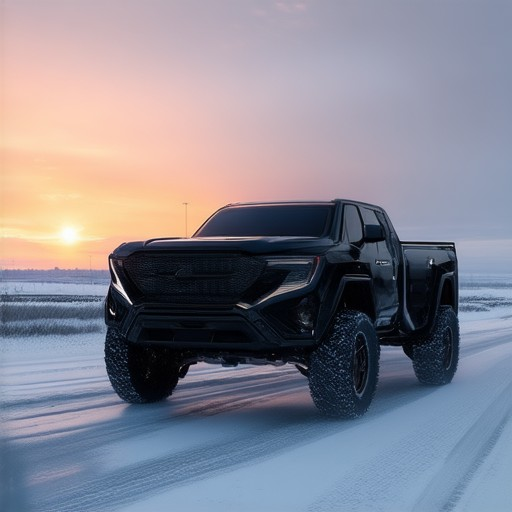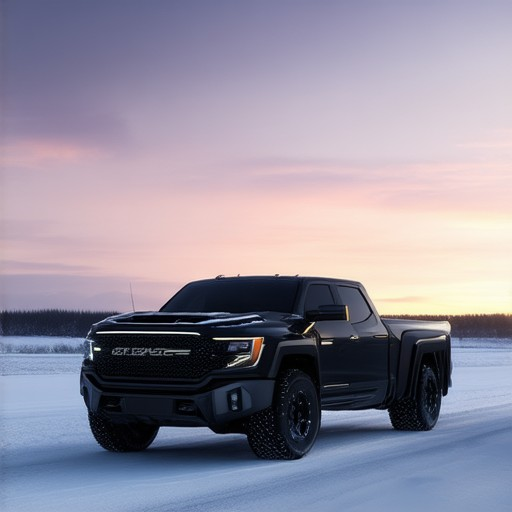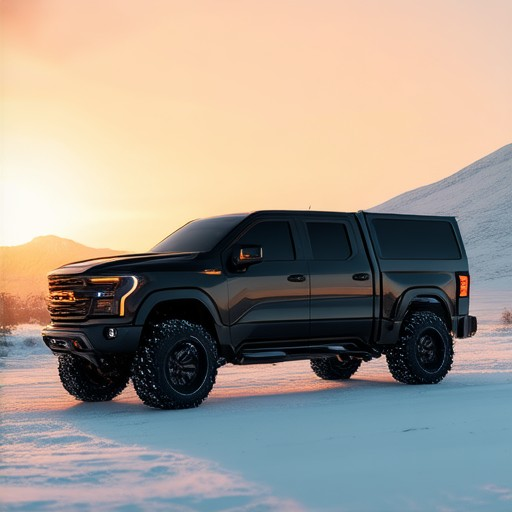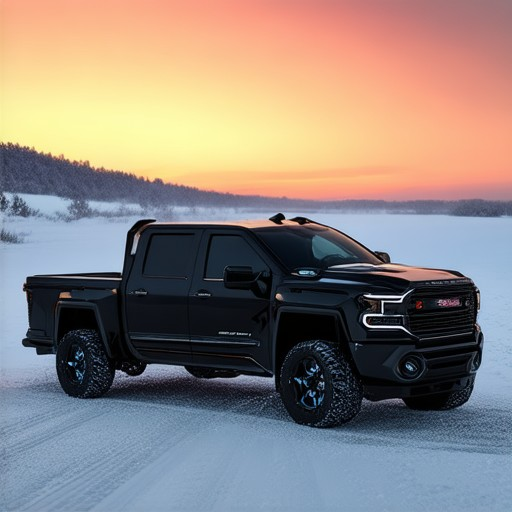When the temperatures drop and winter settles in, ensuring your truck is equipped with the best winter wheels becomes paramount for safety and performance. Winter weather can bring challenging driving conditions, from icy roads to heavy snowfall, making it crucial to have tires that provide maximum traction and durability. Whether you’re commuting daily or embarking on a cross-country journey, the right winter wheels can make all the difference in navigating tricky terrain. This guide will walk you through the key factors to consider when selecting winter wheels for your truck, including vehicle compatibility, traction performance, and installation tips, while highlighting top-rated options and expert recommendations. By making an informed decision, you can ensure your truck is ready to handle whatever winter throws its way, providing peace of mind and reliability during the coldest months.
Key Takeaways
- Prioritize winter-specific tires with deep treads and aggressive patterns for superior snow and ice traction.
- Choose dedicated winter tires for severe conditions or opt for all-season tires in milder climates.
- Ensure winter wheels match your truck’s weight capacity and check vehicle specifications for compatibility.
- Select durable, weather-resistant wheels built to withstand harsh conditions.
- Verify that winter wheels fit your truck’s original equipment in terms of size and alignment.
- Balance budget considerations with quality, considering both premium and affordable options.
- Check warranty coverage and maintenance requirements for long-term reliability.
- Tailor your choice to local climate conditions, using specialized tires for heavy snowfall areas.
Top Winter Wheel Picks for Trucks:
– Incubus TrailBlazer Series: Designed for extreme off-road conditions with aggressive tread.
– Ironman Off-Road Mudder Mat: Offers excellent traction and durability in tough weather.
– BF Goodrich Mud Rover: Engineered for maximum traction in snow and mud.
– Goodyear Wrangler HT: Versatile for various surfaces, including snow and ice.
– Dunlop Grand Trekker: Focuses on stability and control in harsh winter conditions.

What Are the Best Winter Wheels for Trucks?
- Incubus Wheels – TrailBlazer Series : Designed for extreme off-road conditions, these winter wheels feature aggressive tread patterns and reinforced structures to handle heavy-duty applications. Perfect for trucks navigating snow-covered trails or rough terrains. Learn More
- Ironman Off-Road – Mudder Mat : Built for tough weather and rough surfaces, these winter wheels offer excellent traction and durability. They’re a favorite among truck enthusiasts who need reliable performance in challenging conditions. Explore Now
- BF Goodrich – Mud Rover : Known for their exceptional grip in mud and snow, these winter wheels are engineered specifically for trucks. Their deep treads provide maximum traction, making them ideal for winter driving conditions. Check Availability
- Goodyear – Wrangler HT : A versatile option for trucks, these winter wheels combine durability and traction. They’re designed to handle a variety of surfaces, including snow and ice, making them a great choice for everyday use. Shop Now
- Dunlop – Grand Trekker : Tailored for trucks, these winter wheels feature advanced tread technology that enhances stability and control. They’re built to withstand harsh winter conditions while providing reliable performance. View Details
When selecting winter wheels for your truck, consider factors like tread depth, weight capacity, and compatibility with your vehicle’s suspension. These features work together to optimize performance in snowy or icy conditions.
Factors to Consider When Buying Winter Wheels for Your Truck
When purchasing winter wheels for your truck, several critical factors should guide your decision to ensure optimal performance and safety during challenging winter conditions:
- Traction Performance: Prioritize winter-specific tires designed for superior grip on snow and ice. Look for deep treads and aggressive patterns, which can enhance traction in slippery conditions. Studded tires may offer added benefits for extreme situations.
- Suitability for Driving Conditions: Assess your local climate. If you face heavy snowfall or icy roads, opt for dedicated winter tires. For milder climates, all-season tires might suffice, offering a balance between winter performance and year-round usability.
- Load Capacity: Ensure the winter wheels can support your truck’s weight, especially when carrying heavy loads. This aligns with your vehicle’s specifications to prevent fatigue or damage to the wheels.
- Durability and Weather Resistance: Select wheels constructed with robust materials to withstand harsh winter conditions, including impact absorption and flexibility in low temperatures.
- Proper Wheel Size and Fit: Verify that the winter wheels match your truck’s original equipment in terms of diameter, bolt pattern, and offset to maintain optimal performance, braking, and handling.
- Budget Considerations: Balance cost with quality. While premium winter wheels offer superior performance, there are affordable options that provide adequate traction without breaking the bank.
- Warranty and Maintenance: Check the warranty coverage provided by the manufacturer to protect against defects. Regular maintenance, such as tire pressure checks and inspections, ensures longevity and reliability.
- Vehicle Compatibility: Ensure the winter wheels are compatible with your truck’s suspension and braking systems to avoid performance issues or safety hazards.
- All-Season vs. Dedicated Winter Tires: Consider whether all-season tires might be a more economical choice if your area doesn’t experience extreme winter conditions.
By evaluating these factors, you can select winter wheels that not only perform well but also fit within your budget and lifestyle needs. Always refer to your vehicle’s manual for specific recommendations regarding wheel size and compatibility.

Factors to Consider When Buying Winter Wheels for Your Truck
When purchasing winter wheels for your truck, several critical factors should guide your decision to ensure optimal performance and safety during challenging winter conditions:
- Traction Performance: Prioritize winter-specific tires designed for superior grip on snow and ice. Look for deep treads and aggressive patterns, which can enhance traction in slippery conditions. Studded tires may offer added benefits for extreme situations.
- Suitability for Driving Conditions: Assess your local climate. If you face heavy snowfall or icy roads, opt for dedicated winter tires. For milder climates, all-season tires might suffice, offering a balance between winter performance and year-round usability.
- Load Capacity: Ensure the winter wheels can support your truck’s weight, especially when carrying heavy loads. This aligns with your vehicle’s specifications to prevent fatigue or damage to the wheels.
- Durability and Weather Resistance: Select wheels constructed with robust materials to withstand harsh winter conditions, including impact absorption and flexibility in low temperatures.
- Proper Wheel Size and Fit: Verify that the winter wheels match your truck’s original equipment in terms of diameter, bolt pattern, and offset to maintain optimal performance, braking, and handling.
- Budget Considerations: Balance cost with quality. While premium winter wheels offer superior performance, there are affordable options that provide adequate traction without breaking the bank.
- Warranty and Maintenance: Check the warranty coverage provided by the manufacturer to protect against defects. Regular maintenance, such as tire pressure checks and inspections, ensures longevity and reliability.
- Vehicle Compatibility: Ensure the winter wheels are compatible with your truck’s suspension and braking systems to avoid performance issues or safety hazards.
- All-Season vs. Dedicated Winter Tires: Consider whether all-season tires might be a more economical choice if your area doesn’t experience extreme winter conditions.
By evaluating these factors, you can select winter wheels that not only perform well but also fit within your budget and lifestyle needs. Always refer to your vehicle’s manual for specific recommendations regarding wheel size and compatibility.

Factors to Consider When Buying Winter Wheels for Your Truck
When purchasing winter wheels for your truck, several critical factors should guide your decision to ensure optimal performance and safety during challenging winter conditions:
- Traction Performance: Prioritize winter-specific tires designed for superior grip on snow and ice. Look for deep treads and aggressive patterns, which can enhance traction in slippery conditions. Studded tires may offer added benefits for extreme situations.
- Suitability for Driving Conditions: Assess your local climate. If you face heavy snowfall or icy roads, opt for dedicated winter tires. For milder climates, all-season tires might suffice, offering a balance between winter performance and year-round usability.
- Load Capacity: Ensure the winter wheels can support your truck’s weight, especially when carrying heavy loads. This aligns with your vehicle’s specifications to prevent fatigue or damage to the wheels.
- Durability and Weather Resistance: Select wheels constructed with robust materials to withstand harsh winter conditions, including impact absorption and flexibility in low temperatures.
- Proper Wheel Size and Fit: Verify that the winter wheels match your truck’s original equipment in terms of diameter, bolt pattern, and offset to maintain optimal performance, braking, and handling.
- Budget Considerations: Balance cost with quality. While premium winter wheels offer superior performance, there are affordable options that provide adequate traction without breaking the bank.
- Warranty and Maintenance: Check the warranty coverage provided by the manufacturer to protect against defects. Regular maintenance, such as tire pressure checks and inspections, ensures longevity and reliability.
- Vehicle Compatibility: Ensure the winter wheels are compatible with your truck’s suspension and braking systems to avoid performance issues or safety hazards.
- All-Season vs. Dedicated Winter Tires: Consider whether all-season tires might be a more economical choice if your area doesn’t experience extreme winter conditions.
By evaluating these factors, you can select winter wheels that not only perform well but also fit within your budget and lifestyle needs. Always refer to your vehicle’s manual for specific recommendations regarding wheel size and compatibility.
What Are the Best Winter Wheels for Trucks?
- Incubus Wheels – TrailBlazer Series : Designed for extreme off-road conditions, these winter wheels feature aggressive tread patterns and reinforced structures to handle heavy-duty applications. Perfect for trucks navigating snow-covered trails or rough terrains. Learn More
- Ironman Off-Road – Mudder Mat : Built for tough weather and rough surfaces, these winter wheels offer excellent traction and durability. They’re a favorite among truck enthusiasts who need reliable performance in challenging conditions. Explore Now
- BF Goodrich – Mud Rover : Known for their exceptional grip in mud and snow, these winter wheels are engineered specifically for trucks. Their deep treads provide maximum traction, making them ideal for winter driving conditions. Check Availability
- Goodyear – Wrangler HT : A versatile option for trucks, these winter wheels combine durability and traction. They’re designed to handle a variety of surfaces, including snow and ice, making them a great choice for everyday use. Shop Now
- Dunlop – Grand Trekker : Tailored for trucks, these winter wheels feature advanced tread technology that enhances stability and control. They’re built to withstand harsh winter conditions while providing reliable performance. View Details
When selecting winter wheels for your truck, consider factors like tread depth, weight capacity, and compatibility with your vehicle’s suspension. These features work together to optimize performance in snowy or icy conditions.

Factors to Consider When Buying Winter Wheels for Your Truck
When purchasing winter wheels for your truck, several critical factors should guide your decision to ensure optimal performance and safety during challenging winter conditions:
- Traction Performance: Opt for winter tires with deep treads and aggressive patterns designed for maximum grip on snow and ice. Studded tires may offer enhanced traction in icy conditions.
- Suitability for Driving Conditions: Choose tires suited for your primary usage—whether it’s daily commuting or off-road adventures. All-season tires might suffice for milder climates, while dedicated winter tires are ideal for severe conditions.
- Load Capacity: Ensure the winter wheels can support your truck’s weight, especially when carrying heavy loads. Check the vehicle’s specifications to match the correct load rating.
- Durability: Select tires built to withstand harsh winter elements, including impact absorption and flexibility in low temperatures. Look for robust constructions and high-quality materials.
- Wheel Size and Fit: Verify that the winter wheels match your truck’s original equipment in terms of diameter, bolt pattern, and spacing to maintain proper handling and performance.
- Budget Considerations: Balance cost with quality. While premium winter wheels offer superior performance, there are affordable options that provide adequate traction without breaking the bank.
- Warranty and Maintenance: Examine the warranty coverage provided by the manufacturer and consider the tire’s maintenance requirements to ensure long-term usability and reliability.
- Vehicle Compatibility: Confirm that the winter wheels are compatible with your truck’s existing suspension and braking systems to prevent issues like vibration or reduced stopping power.
- Environmental Factors: Tailor your choice based on your local climate. Areas with heavy snowfall may benefit from specialized winter tires, whereas milder regions might get by with all-season tires.
By thoughtfully evaluating these factors, you can select winter wheels that not only perform well in adverse conditions but also align with your specific needs and budget.




0 Comments